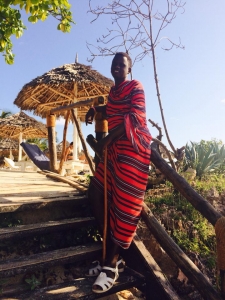It’s no secret that Africa is fast becoming the gateway for many international investors and businesses. Once termed “The Dark Continent”, Africa is now often celebrated by publication titles placing emphasis on its meteoric rise. What then does all this mean for Africans in Africa, and particularly, African women? Read below as Hlengiwe Dlamini gives us insightful content on business conduct in Tanzania, as experienced whilst completing her secondment in Dar Es Salaam…

I have been privileged enough to go on a secondment in East Africa to the Norton Rose Fulbright Dar es Salaam office during my Articles of Clerkship for a period of 6 months. New country, new cultures, new people and a different way of doing business. The areas of practice I have been exposed to are to a large extent, amongst other areas, Banking and Finance, Corporate, Mergers and Acquisitions and Employment. The key industry sectors that I have had an opportunity to explore so far are technology and innovation, energy, financial institutions, infrastructure, mining and commodities and transport.
It goes without saying that, based on my exposure in Tanzania; I have to come to discover that there are a host of business conduct lessons and observations that we can learn from our Tanzanian counterparts. With a 2013 population count of almost 50 million people, it seems as though Tanzania is becoming one of Africa’s strong players in attracting new business and foreign direct investments.

Apart from the obvious difficulties in doing business that one would come across in any African market, the following – on observation – are some of the major challenges faced by investors setting up a business in Tanzania:
- Poor infrastructure (particularly transport and energy and poor access to electricity);
- Access to land. There are stringent laws and regulations governing the ownership of land by non-Tanzanians in Tanzania, which equates to a lack of business premises available and affordable;
- Lack of access to information (access to government procurement purchasing opportunities);
- High interest rates (VAT in Tanzania is 18%); and
- Difficulties enforcing contracts through the courts.
Because certain sectors are not properly regulated, players in the relevant markets are often unsure of the appropriate procedures and processes to follow when attempting to establish a specific type of business in Tanzania. As a result, there is a definite need for structured and easily accessible regulations and legislation.
The most common strategic arrangements I have come across in Tanzania are joint ventures and shared ownership. These appear to be the preferred company structures, particularly since they allow for better access to land, in light of the fact that non-Tanzanians cannot own any land within the country. Interestingly, although the legal system in Tanzania is largely unregulated, the country has a strong regulation system in place for key sectors such as taxation, land, shipping and export.

One notable observation is the country’s great dependency on agriculture for its business and economic growth, leading to the advocacy of agriculture and agro-processing as the prime focus for the Government. In addition to this, other sectors such as energy, mining, telecommunications, tourism and financial services have emerged as important investment prospects.
Development in Tanzania is boosted by the country’s major focus on foreign investment whilst remaining mindful of its benefits for the residents and citizens. For example, land in Tanzania is held by the President on behalf of the people. Foreign investors lease out property for purposes of conducting business. There is a definite move forward with the recent lifting of control by the Government over investment share ownership which could potentially mean a major increase in business for the Dar es Salaam Stock Exchange (DSE). The goal of this recent change is to lead the DSE to becoming one of Africa’s top performing stock markets.
Small, independent, family-owned businesses with simple structures – “mom and pop stores” – are incredibly successful in Tanzania as their recipe for success has been tried and tested. In most instances, these types of businesses usually struggle in a large market, but because Tanzania is not yet dominated by franchises and large corporations with multiple operations in various locations, the mom and pop stores perform well in the market.

Business in Tanzania still seems to be male dominated. There aren’t many females in the corporate sphere and I get the sense that many people here are still very traditional in their beliefs on what the role of a woman should be (including the women). However, most of my peers that I have interacted with have either studied abroad or are making plans to work abroad in order to gain experience. They feel that the education system in Tanzania is not strong enough to compete with the world, let alone the rest of Africa. The younger generation has a lot of more ambition and prospects of doing great things, not only abroad, but within their very own country.
There is unification of culture in Tanzania with the exception of a few ethnic groups such as the Maasai. Not a single day goes by without one bumping into and getting the warmest welcome from a Maasai warrior. I like to think of them as the protectors or peacekeepers of the country. The one remarkable feature that Tanzania possesses over other nations is the genuine and immense welcome one receives as a non-Tanzanian, from a Tanzanian. My journey so far has definitely been an “Eat, Pray, Love” kind of experience with tons of learning still to be done!
Not only have I learnt a vast amount from the way business is generally conducted in Tanzania but when compared to business conduct in South Africa, Tanzania is quickly catching up in many areas where “big international players” view South Africa as the stronger player. Basic difficulties such as access to water and energy in Tanzania has somewhat crippled the business market but nonetheless the country is quickly rising to the occasion.
Based on my time in this country, I can confidently state that there are great opportunities in Tanzania and East Africa as a whole and the global market is starting to realize the immense business potential in Africa. Without a doubt, with the right business development strategies, promulgation and enactment of legislation to regulate the different sectors, Tanzania will be a relentless competitor in the business market.
Article Credit:
Hlengiwe Dlamini
Age: 23
Candidate Attorney: Norton Rose Fulbright
Credentials: Bachelor of Laws (LLB), University of Pretoria
All images provided by Hlengiwe Dlamini
Image Credit:
Ocean landscape taken by Khethiwe Mavundla
Image of Masai taken by Khethiwe Mavundla